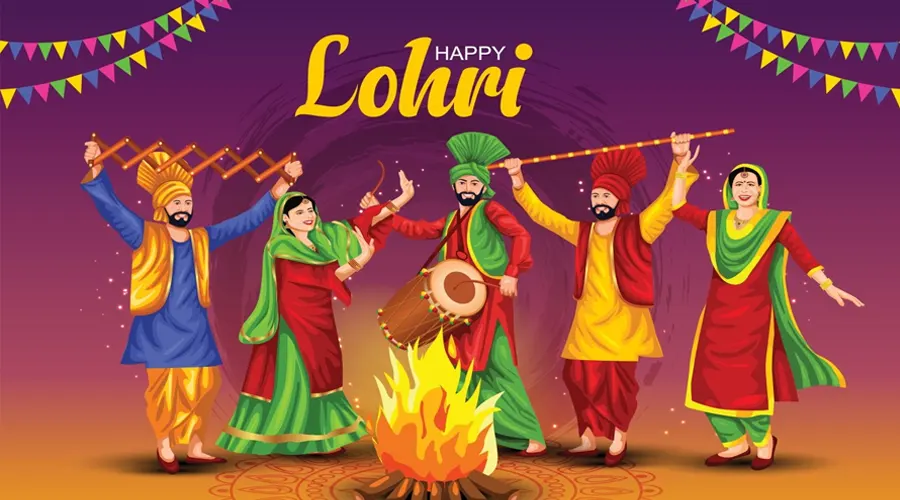Lohri a popular Indian festival that is celebrated to mark the beginning of the harvest season for winter crops
Lohri is celebrated in parts of Northern India a night before Makar Sankranti. It is a popular Indian festival that is celebrated to mark the beginning of the harvest season for winter crops. Every year, during the month of Paush, a day before Makar Sankranti - usually on January 13, with much fanfare especially by the people of Punjab, Lohri is celebrated. The festival is also popular in other parts of the country such as Himachal Pradesh, Haryana, and Jammu.
Originally, it was observed on the evening before the Winter Solstice, but in recent years, it is observed the day before Makar Sankranti. Lohri, also known as Lohadi or Lal Loi, is a festival closely related to Makar Sankranti. Lohri festival is traditionally associated with the harvest of rabi crops. It is time to harvest sugarcane crops. Even the Punjabi farmers after Lohri (Maghi) see it as the financial New Year. Three edibles are associated with the Lohri festival that is rewri, peanuts, and popcorn.
Lohri festival is a time of untainted extravagance. Singing folk songs, dancing to the tunes of dhol, performing bhangra, gidda, and chajja, relishing makki ki roti and sarson ka saag, and munching gajak, moongfali, tilkut, puffed rice, revdi, popcorn by the bonfire are some of the popular Lohri rituals.
Indian Origins of Lohri
There are numerous origins of Lohri. The main subject of Lohri is the conviction that Lohri is the enlightening celebration of Winter solstice. The key trait of Lohri is the bonfire. Illuminating the fire has been familiar in winter solstice festivals all through time. It implies the comeback of the longer days.
Lohri is an official holiday in Punjab, Jammu, and Himachal Pradesh. The festival is celebrated in Delhi and Haryana but is not a gazetted holiday. Lohri is celebrated by Sikhs, Hindus, and whoever wants to enjoy it.
Legends of Lohri Origin
- Dulla Bhatti
The main theme of Lohri's songs is related to the legend of Dulla Bhatti. Dulla Bhatti lived in Punjab state during the supremacy of Akbar. He was looked upon as a hero of Punjab. He salvaged deprived Punjabi girls, being powerfully taken to be sold in the slave marketplace of the Middle East from the Sandal Bar region.
- Loi
Some people think that Lohri has derived its name from the word “Loi”. Loi was the wife of Saint Kabir.
- Loh
Some people think that Lohri has derived its name from the word “Loh”. Loh means the warmness and light of a fire.
The Bonfire Ritual
In the dusk, massive bonfires are lit in harvested fields and front yards of homes. People get together around the flames, circle the bonfire toss puffed rice, munchies, and popcorn into the fire, and hum popular folk songs. They pray to the fire god, to sanctify the land with prosperity and abundance. The prasad consists of 5 major items: gajak, til, jaggery, popcorn, and peanuts.
Date of Lohri Festival
By the solar part of the lunisolar Bikrami calendar or as per the Hindu solar calendar, Lohri falls in the Paush month.
History and significance of the Lohri Festival
In the state of Punjab, the breadbasket of India, Wheat is the major winter crop, which is planted in October and reaped in March or April. In January, the fields turn up with the swear of a golden harvest and farmers celebrate the Lohri festival during this period before the cutting and gathering of the crops.
During this period, the earth which is farthest from the sun, initiates its journey towards the sun, consequently ending the coldest months of the year, Paush. It announces the beginning of Magh and the propitious period of Uttarayan. Following the Bhagavad Gita, Lord Krishna gives evidence of himself in his full splendor this time. The Hindus annul their sins by taking a bath in the Ganges River.
Another special significance attached to the celebration of Lohri is that on this day, the sun enters the Rashi (zodiac) of Makara (Capricorn) which is considered auspicious as it signifies a fresh start. A few accounts attribute the origin of the festival to the Himalayan Mountain region where the winters are colder than the rest of the country.
A legend attributes the celebration of Lohri to the tale of ‘Dulla Bhatti’ who was a local hero of the Punjab region and during the reign of the Mughal Emperor, Akbar, worked as a saviour of the people and was considered the ‘Robin Hood’ of Punjab as he would steal from the rich to provide for the poor. He famously saved a group of young girls from being sold into slavery.
He would arrange the girls’ marriages to the village boys and provide them with dowry from the stolen loot. Amongst these girls were Sundri and Mundri, who have now come to be associated with Punjab’s folklore, Sunder Mundriye.
His deeds have been passed down as a legend and are deeply inculcated in the Punjabi folklore. On Lohri, ‘Dulla Bhatti’ is celebrated and various songs and dances are performed in his honor.
As per Punjabi folklore, the folk song, Sunder Mundriye has a special place in the hearts of women who have grown up hearing the stories of Dulla Bhatti or Abdullah of Pindi Bhattian.
The folk song which is sung by the people while celebrating Lohri..!!
Sunder mundriye Hoo, Tera kaun vicaharaa Hoo..!!
Dullah Bhatti walla Hoo, Dullhe di dhee vyayae Hoo..!!
Ser shakkar payee Hoo, Kudi da laal pathaka Hoo..!!
Kudi da saalu paatta Hoo, Saalu kaun samete Hoo..!!
Chacha choori kutti Hoo, zamidara lutti Hoo..!!
Zamindaar sudhaye Hoo, Ginn-ginn bhole aaye Hoo..!!
Ek bhola reh gaya Hoo, Sipahee pakad ke lai gaya Hoo..!!
Sipahee ne mari itt Hoo, Phannve ro te phannve pit Hoo..!!
Lohri Deyo Ji Lohri jeeve tuhadi jodi


Comments (0)